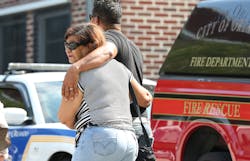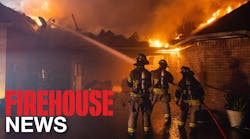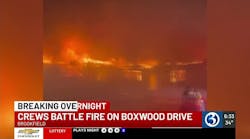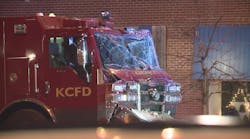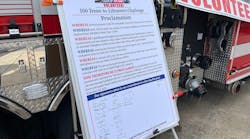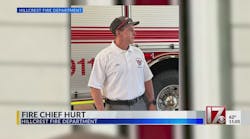Standing outside the yellow police tape that cordoned off Pulse, a gay nightclub that became the scene of the worst mass shooting in U.S. history, Orlando, Fla.’s first openly gay city commissioner pointed toward the building.
“There was blood all over the street. You can see where people were dragged,” Patty Sheehan said, grimacing.
This is the heart of her downtown district. Sheehan knows the owner of the club and a bartender who witnessed the shooting early Sunday morning, and described to her how it unfolded.
“When the police went in, they told people, ‘Raise your hand if you’re alive,’ ” she said. “Some of the living covered themselves with the dead.”
She and other officials have asked residents to hold off on staging a vigil until all the victims are identified. But she stressed that the attack “is not reflective of who we are as a community.”
Mayor Buddy Dyer said officials are concentrating on notifying and supporting families of those killed. All but one of the 49 shooting victims have been identified, their bodies removed from the scene, and 24 of the victims’ families have been notified so far, officials said. Gunman Omar Mateen, 29, of Fort Pierce, Fla., was also killed during the attack when confronted by police. At least 53 others were wounded, with many still hospitalized Monday.
“We will not be defined by the act of a cowardly hater,” Dyer said. “We will be defined by how we respond.”
Police responding to the deadly nightclub attack had attempted to negotiate with Mateen for hours early Sunday, Police Chief John Mina said, rescuing dozens of people and confronting the shooter only when he mentioned explosives and they believed “further loss of life was imminent.”
Mina outlined the police response during a Monday briefing near the scene of the shooting at the nightclub, flanked by Florida Gov. Rick Scott, Dyer, federal investigators and prosecutors.
The shooting was reported at 2:02 a.m. Sunday when an off-duty Orlando police officer at the club initially confronted Mateen near an entrance and the two engaged in a “gun battle,” Mina said.
When more police responded, additional officers entered the club and traded fire with the gunman.
"At that time we were able to save and rescue dozens and dozens of people and get them out of the club," Mina said.
Mateen holed up with four to five hostages in the bathroom, while 15 to 20 more people were trapped in another bathroom nearby, Mina said.That’s when police backed off.
“Based on statements made by the suspect about explosives and an explosive vest, we did retreat,” Mina said.
A team of negotiators arrived at the scene and began communicating with Mateen, who sounded “cool and calm,” Mina said.
During their discussions, Mateen spoke of “an allegiance to Islamic State,” Mina said. At some point, Mateen also called 911 to pledge allegiance to Islamic State and mention the Tsarnaev brothers, who were responsible for the Boston Marathon bombing in 2013, according to two U.S. law enforcement officials.
Mina said negotiators didn’t have much leverage with the gunman.
“He really wasn’t asking for anything,” the police chief said. “We were doing the asking.”
Mina would not say whether Mateen appeared to be on a suicide mission. But police kept talking to him and shortly before 5 a.m., Mina said, “that talk became a crisis for us.”
Officials decided to enter the building, Mina said, because, “There was a timeline given [by Mateen] and we believed there was an imminent loss of life.”
Police made an “explosive breach” into the building, then used an armored Bearcat vehicle to punch a hole about two feet square in the wall so that dozens could escape, Mina said.
Mateen also emerged from the hole, armed with a long gun and handgun, and confronted SWAT officers backed against a cement wall who returned fire, killing him, Mina said.
The police chief said Mateen did not shoot between the time he retreated to the bathroom and when police breached the building. Mina defended the decision to wait and attempt to negotiate with the shooter before police finally forced their way into the building.
Mina said he was confident no one was shot during the delay nor was shot by friendly fire.
"It was a hard decision to make,” he said. “We believe it was the right thing to do. We believe we saved many, many lives."
Mateen bought both of the guns used in the attack, and a third weapon was recovered from Mateen’s car, according to ATF Special Agent Regina Lombardo. Officials would not identify the weapon found in Mateen’s car or say whether any explosives were recovered from the scene.
Officials are still investigating whether other individuals were involved in the attack, although there is no danger to the public, U.S Attorney A. Lee Bentley III said.
Although Mateen was a lone shooter, authorities said, investigators are looking into whether he had help.
"If anyone else was involved in this crime, they will be prosecuted,"said Lee Bentley of the Florida Department of Law Enforcement.
FBI Tampa Special Agent in Charge Paul Wysopal said "hundreds" of leads were being pursued.
Wysopal said FBI officials in Washington, D.C., were also backtracking to investigate their prior contacts with the gunman. Mateen was placed on a terrorist watch list maintained by the FBI when its agents questioned him in 2013 and 2014 about potential ties to terrorism, according to U.S. law enforcement officials who spoke on condition of anonymity to discuss the case.
“Headquarters is taking a look at those other incidents,” Wysopal said.
Some who knew the gunman described him as a practicing Muslim who spewed homophobic and racist slurs. But it still wasn’t clear Monday what motivated Mateen to attack the nightclub.
His father, Seddique Mateen, hosts a show on the satellite network Payam-e-Afghan TV about the national politics of his homeland. In new video posted on Facebook early Monday, he calls his son well-educated and respectful to his parents, saying that he was "not aware what complexities he had in his heart, and what caused him to go to this gay and lesbian club and shoot 50 people," he said in Dari, one of the two official languages of Afghanistan.
Seddique Mateen said he was saddened by his son's actions. But he added: "in this month of Ramadan, the gay and lesbian issue is something that God will punish," though "the servants of God shouldn't have anything to do with it."
Mustafa Abasin, Mateen’s brother-in-law, stood in the doorway of his pastel pink, three-bedroom home in Port St. Lucie, a city close to Fort Pierce, about 125 miles south of Orlando, still struggling to make sense of what had happened.
“Omar was a very good guy,” he said. “You know, right now I feel that I’m grieving. I’m not awake. It’s unbelievable. It wasn’t him.”
On Sunday investigators swarmed Abasin’s home, which was in Mateen’s name, although he never lived there. When they informed him of his brother-in-law’s actions, he said, he assumed there had been a misunderstanding.
“The only thing that popped in my mind was it was an accident,” he said. “Still, I can’t believe it.”
When Abasin, a local insurance broker, last encountered Mateen at their local Islamic center on Friday, he seemed normal and chatted about family.
“We had the usual conversation,” Abasin said. “He was very respectful and polite. He said, “Hello, how are you? How are the kids?" He loved my kids. I didn’t see any emotions.”
He had never known his brother-in-law to talk about politics or violence, he said, and had not heard him express hostility toward gay people or African Americans.
“We feel sorry for those who lost their lives,” he said. “We feel sorry for families who lost their family members. We pray for them.”
Abasin was anxious about the effect of Mateen’s actions on his family. Along with investigators, demonstrators showed up outside his home Sunday.
“We want to be living in peace,” he said. “We have small kids and are living in this neighborhood.”
He described Mateen’s father as a responsible member of the community.
“He was involved in politics, but I don’t think he agrees with extremism,” Abasin said. “He’s not a fundamentalist."
Special correspondent Jarvie reported from Port St. Lucie, Florida. Times staff writer Tracy Wilkinson and special correspondent Hashmat Baktash contributed reporting from Orlando and New York, respectively.
———
©2016 the Los Angeles Times
Visit the Los Angeles Times at www.latimes.com
Distributed by Tribune Content Agency, LLC.
